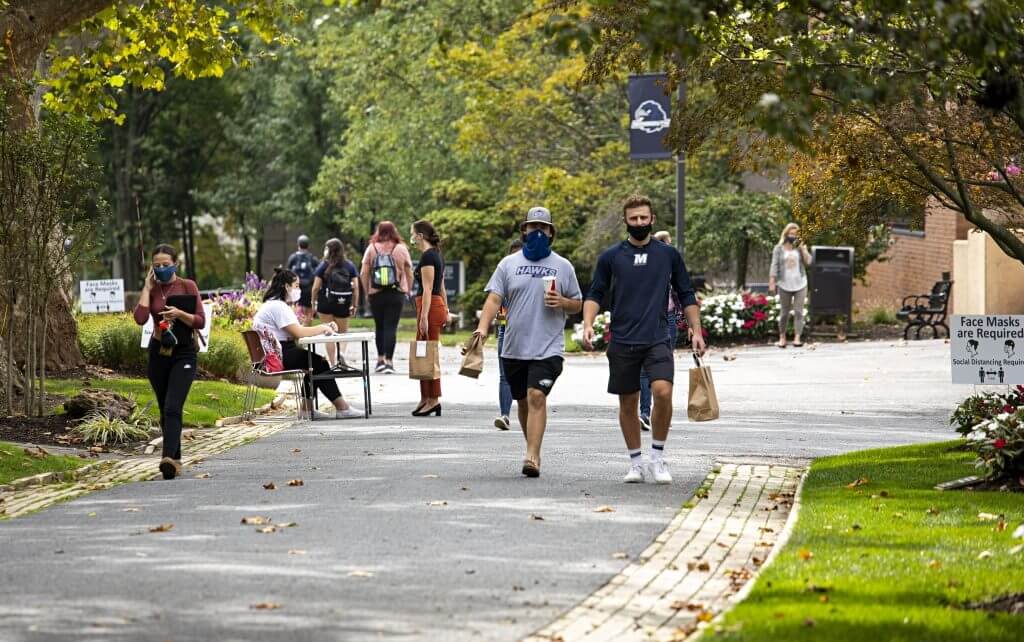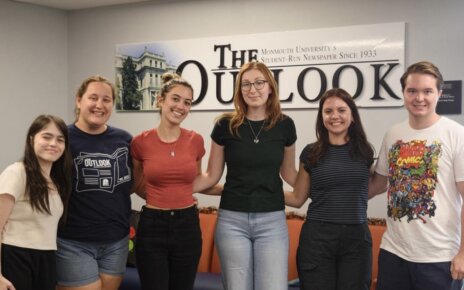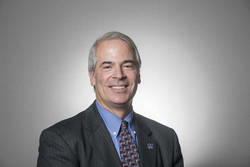President Patrick F. Leahy Ed.D., and Specialist Professor of Communication Matt Harmon discussed the fall semester on their weekly “Monmouth Mondays” podcast on Friday, Sep. 3. The episode detailed COVID-19 related health protocols and updates to campus facilities.
“We so desperately wanted COVID to be in the rearview mirror,” Leahy said. “We got to May and had our spring commencements, and we were reporting on our [COVID-tracking] dashboard zero cases, week after week after week.”
The delta variant, a strain of SARS-CoV-2, the virus that causes COVID-19, reached Monmouth County in recent months. “Given our unique location at the shore, we invite lots of visitors to our great piece of heaven here,” Leahy explained. “We no doubt had a spiking in COVID cases in our area.”
As of the episode’s recording, three COVID-19 cases were reported within the University community. The spread of the Delta variant prompted the inclusion of healthcare protocols that University administration hoped would not have to be implemented, Leahy said. “It has forced us to realize the harsh reality that the pandemic is not in fact behind us and we’re still very much dealing with it,” he added.
Students, faculty, and staff are required to wear masks indoors regardless of vaccination status. This precaution comes as a result of prevailing public health recommendations from the Monmouth County Public Health Department, the state of New Jersey and Center For Disease Control (CDC), Leahy explained.
Vaccination levels for the University community are high, Leahy said. 94 percent of faculty and staff are fully vaccinated, as well as 85 percent of students.
“Our vaccination policy… said that we are mandating the vaccine for all members of our campus community. We’re not going to treat the faculty and the staff separate from students; we just didn’t think that was fair. We put a mandate in place for all of our campus community.”
“Underlying these masking protocols that we have put in place is a really strong level of vaccination amongst the monmouth university community, and that is a great comfort as we go into the fall semester,” Leahy said.
Removing the indoor mask requirement will be considered as daily COVID figures continue to be determined.
“We’ll make adjustments when we think it’s safe to do so,” Leahy said. “I know that I don’t want to stay masked up any more than anybody else does, but we’ll look at it daily as we’ve been doing all along.”
COVID restrictions will be reasonable when it comes to eating and drinking, Leahy said.
Dining halls will be left open and students will not have to wear a mask when enjoying a meal.
If the University were to remove the indoor mask mandate, unvaccinated people will still need to adhere to the mandate. Unvaccinated members of the campus community will also remain subject to surveillance testing on a regular basis, Leahy explained. “Those are protocols that, if we’re granting you a vaccination exemption, you have to comply with that are not necessary for vaccinated people.”
Leahy stressed that unvaccinated individuals who properly follow healthcare protocols are considered fully compliant in the eyes of the University.
“I want to make sure that there’s no sort of difference of opinion among the vaccinated and the unvaccinated,” Leahy said. “We have the policy in place, and as long as the unvaccinated have followed those policies, I consider them fully compliant and [they] should be included as full members of our community, whether that’s faculty, a staff member, or student.”
Leahy appreciates that there’s a wide variety of opinions on the vaccine mandate, he explained.
“I can’t imagine the number of messages that we’ve tried to respond to over the course of the summer. People want to be heard, in our community, and they deserve to be heard. They’re in the right to be heard, and if they reach out to us, we’ll respond to them and just try our best to articulate, more fully, the rationale behind our policies.”




